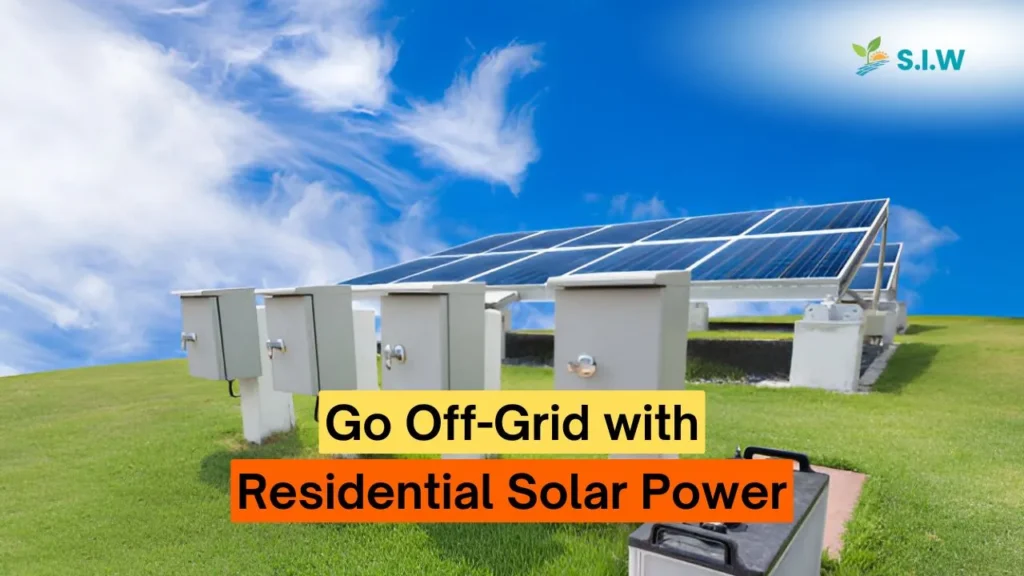Are you considering making the switch to a more sustainable lifestyle? The idea of going off-grid with residential solar power is becoming increasingly popular, and for good reasons. Solar energy not only reduces your dependence on traditional electricity grids but also helps you minimize your environmental impact. With advances in solar technology, it’s easier than ever to achieve energy independence and live a more eco-friendly life.
Why Choose Solar Power?
Solar power is renewable, reliable, and cost-effective. The sun offers a limitless source of energy that, once harnessed, can provide consistent electricity for your home. Unlike fossil fuels, solar energy doesn’t run out or cause harmful emissions. More importantly, it can help homeowners reduce or even eliminate their reliance on grid-based electricity, providing long-term savings on utility bills.
The environmental benefits of solar power are undeniable. By generating clean, renewable energy, you’re contributing to the reduction of greenhouse gases and reducing your carbon footprint. Going solar also means less dependence on coal and other fossil fuels, which are major contributors to global warming.
How Does Residential Solar Power Work?
Understanding how solar panels work is the first step to going off-grid. Solar panels are made up of photovoltaic (PV) cells, which convert sunlight into electricity. This energy is then used to power your home or stored in batteries for later use. When your solar panels generate more electricity than your household needs, the excess energy can either be stored in a battery backup system or fed back into the grid for credit (depending on your location and local regulations).
In an off-grid setup, your system is designed to be self-sufficient. You generate your electricity, store excess power in batteries, and have enough energy for nighttime or cloudy days. Proper battery storage is critical in off-grid systems to ensure that you have a consistent power supply even when the sun isn’t shining.
The Benefits of Going Off-Grid
- Energy Independence
By going off-grid, you’re no longer at the mercy of power outages or grid failures. You can enjoy a stable, reliable source of energy, even in rural or remote areas where grid access is limited. With solar energy, your household can become fully self-sufficient, meaning you won’t have to worry about fluctuating electricity prices or unexpected blackouts. - Cost Savings
While the upfront cost of installing solar panels and batteries can be significant, it’s a long-term investment that will eventually pay off. Solar systems reduce or eliminate monthly energy bills, providing considerable savings over time. Many governments also offer tax incentives, rebates, and grants that can offset the initial costs of solar installation. - Environmental Impact
One of the most compelling reasons to go off-grid with solar energy is its positive environmental impact. Solar energy is a clean, renewable source of power that significantly reduces carbon emissions compared to traditional energy sources. By switching to solar, you’re actively helping combat climate change and protecting the environment for future generations. - Resilience and Reliability
In times of natural disasters, storms, or grid failures, an off-grid system can keep your household running. Solar panels coupled with battery storage allow you to have electricity when the rest of the grid goes down. This resilience is especially valuable in areas prone to frequent outages or extreme weather events.
How to Get Started with an Off-Grid Solar System
Transitioning to an off-grid solar power system requires careful planning. Here are the key steps to take:
1. Assess Your Energy Needs
Before installing solar panels, you need to determine how much electricity your household consumes. Analyze your past utility bills to understand your energy usage patterns, and consider energy-efficient appliances to reduce overall demand.
2. Choose the Right Solar Panels
The size and efficiency of your solar panels will directly impact your energy production. Look for high-efficiency panels that maximize energy generation, especially if you have limited roof space. Monocrystalline panels are often the most efficient option, though they may be more expensive than other types.
3. Invest in Battery Storage
To go off-grid, you’ll need a reliable battery system that stores excess energy generated during the day. Lithium-ion batteries are the most popular choice for residential solar systems due to their longevity and efficiency. Ensure your battery storage system is large enough to cover your energy needs during the night or cloudy days.
4. Install a Backup Generator
Even with solar panels and batteries, it’s wise to have a backup generator for emergencies. This can serve as a safety net if your solar system can’t produce enough power, ensuring you have continuous electricity during extended periods of bad weather.
5. Work with Professional Installers
Installing an off-grid solar power system requires technical expertise. Work with certified solar installers to ensure your system is designed and installed correctly. They can also help you navigate local regulations and apply for available rebates or tax credits.
Is Off-Grid Solar Right for You?
While going off-grid offers numerous benefits, it’s not for everyone. Consider factors such as your location, energy consumption, and initial investment before making the switch. Remote or rural areas, where grid access is unreliable or non-existent, are ideal for off-grid solar systems. However, homeowners in urban areas can also benefit from going off-grid if they prioritize energy independence and sustainability.
Keep in mind that off-grid solar requires a significant upfront cost, and you’ll need to maintain your system regularly to ensure it runs efficiently. Solar panel cleaning, battery maintenance, and monitoring system performance are all essential to ensure long-term success.
Final Thoughts
Going off-grid with residential solar power is an excellent way to achieve energy independence, reduce your carbon footprint, and save money in the long run. With the right system in place, you can enjoy a stable, reliable source of electricity while contributing to a greener, more sustainable future. Whether you live in a remote area or simply want to cut ties with the traditional energy grid, now is the perfect time to embrace the power of the sun.








